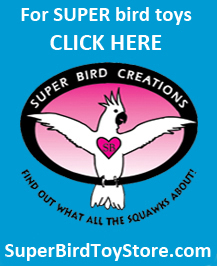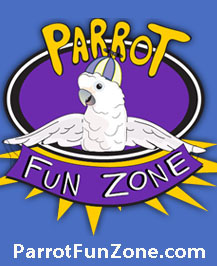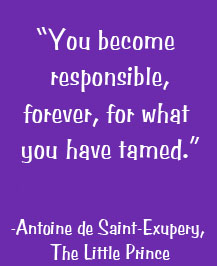Sprouts: Discover the Most Nutritious Avian Food
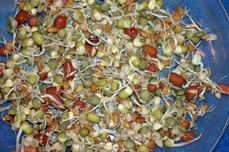
“I want to provide the best nutrition possible for my birds.”
This affirmation resounds from experienced breeders, parrot rescue organizations and individual bird owners alike. What does this growing segment of avian caretakers consider the best nutrition available for parrots? They all feed sprouts, the most nutrient dense food on the planet.
Why are Sprouts so Nutritious?
When any seed, nut, grain or legume is sprouted its entire chemical composition is enhanced. Sprouting is the relatively simple process of soaking, draining and rinsing seeds until they germinate. The germinated seeds, grains and legumes must then be allowed to grow in order for them to reach their peak nutrition. The germination and sprout growing process transforms whole foods into avian super foods that are:
Packed with Vitamins, Minerals and Antioxidants
The sprout growing process causes the formation of vitamins and an increase in all vitamins present. This makes sprouts a rich source of vitamins C, E, B complex and beta-carotene. Any minerals present become chelated, making them easier for the body to assimilate.
Sprouts also contain an overwhelming quantity of life-enhancing antioxidants. Antioxidants come in a variety of forms, each one provides unique chemical components as they target and bind to specific free radicals. When the level of free radicals rise above what the body can manage, they begin altering the way cells code genetic material.
Abundant in Enzymes
When sproutable foods are germinated and allowed to become sprouts they now provide an abundant source of enzymes. By nature enzymes are catalysts, substances that induce hundreds of thousands of biochemical processes in the body. Enzymes are essential for good health and they make every single biochemical process possible. The brain, nervous system, vascular system, cell regeneration, growth, immunity, the digestive system, and all the vital organs (liver, kidneys, heart, and lungs) all depend on enzymes to function properly. According to Clinical Nutritionist Phyllis Balch, in her book “Prescription for Nutritional Healing”, sprouts (not soaked seed but sprouts) are the most abundant source of enzymes available. Although all raw foods contain enzymes the amounts present in sprouts can be 10 to 100 times greater than the amounts that are present in raw fresh fruits and vegetables.
Protein Rich
Like enzymes, proteins are also essential to life. Proteins form the structural basis of chromosomes. Each DNA strand contains the genetic code that is the formula for making that cell’s unique protein chain. Proteins are the primary building blocks that makeup every cell in the body. Proteins build healthy muscles, blood, skin, feathers, nails, and vital internal organs. Proteins are essential for proper growth, development, reproduction and a well functioning immune system. Having a diet rich in complete protein is a fundamental nutritional requirement for a parrot to cope with stress effectively. When feeding a sprouting blend that contains all the essential amino acids you are providing an easily digested source of complete protein.
The Benefits of Feeding Sprouts
The avian body requires hundreds of different nutrients daily. Malnutrition is the leading cause of illness, disease and premature death in captive parrots. This statistic is tragic, especially since malnutrition can be prevented and reversed.
Sprouts provide a wealth of nutrients that are easily assimilated and utilized by the body. As the body receives the type and quality of nutrition it craves, regeneration and healing can begin at the cellular level. This results in improved health, increased longevity, a more congenial temperament, and beautiful plumage.
Introduce your flock to the superior nutrition of sprouts and watch your birds transform as they receive the benefits only this outstanding super food can provide. What positive changes have people seen after feeding their birds nutrient rich sprouts? Many have reported observing:
- significant improvements in feather condition and color,
- fewer illnesses, and birds with health issues have experiences strong recoveries,
- reversal of obesity problems, and
- reduction in feather destruction behaviors.
Achieving Successful Sprouting Results
There are several reasons why seeds, nuts grains or legumes do not sprout:
- Age - If a seed, nut, grain or legume is no longer viable (i.e., dead) it cannot germinate.
- Using a poor quality or poorly formulated sprouting blend, or
- Using a sprouting method that is incompatible with the climate where you live.
To ensure success:
- Purchase sproutable foods from organic sources that are known to be fresh and viable.
- Follow recommended procedures as to soaking times, rinsing cycles, temperature and light.
- Use GSE (Grapefruit Seed extract) to eliminate the potential for bacterial growth.
Will my Parrot Like Sprouts?
Experience has shown that 70 to 90 percent of the birds introduced to sprouts enthusiastically eat them the first time. Parrots have an instinctive ability for selecting and eating foods that have medicinal properties, or are rich in nutrients their body’s need. When sprouts are fed as the foundation food, along with a wide selection of organic fresh fruits and vegetables you are providing the highest quality nutrition possible.
 Everything You Need
Everything You Need
So where can you find a fresh supply of sprouts that provides a balance of all the essential amino acids? The best source of fresh sprouts for your birds is to grow them yourself.
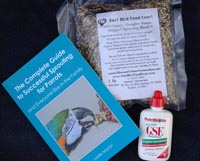
“The Complete Guide to Successful Sprouting for Parrots”, is the quintessential source for learning to sprout for your birds. This book is a detailed guide reinforcing the healthful benefits and superior nutritional qualities of sprouts, while simplifying the process of growing, caring for, and feeding sprouts to your birds. Learn how to use GSE when sprouting. Discover how to tailor your sprouting process to suit the area of the country you live in. An entire chapter is also dedicated to the topic of helping your birds learn to enjoy - and look forward to receiving, their dish of tasty, nutritious sprouts.
*************
Leslie Morán has been a professional in the area of holistic animal health care for nearly 30 years. She is an internationally recognized expert in holistic avian nutrition and natural healthcare. The personalized consultations and holistic animal communication and healing sessions she provides help her clients achieve the results they desire. Her regular monthly column, “The Holistic Parrot”, appears in “Parrots” magazine. This periodical is published monthly in England with distribution in over 60 countries. Morán is passionate regarding raising awareness about avian nutritional needs. The goal of her book, Sprouting Kits and the 100% Organic Sprouting Blends, is to eliminate avian malnutrition, and its destructive impact, one parrot at a time. Learn more about her consultations at her website www.BestBirdFoodEver.com.
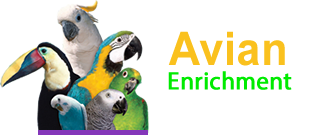

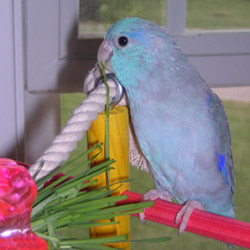 Parrots are known to be very sensitive to environmental toxins (air pollutants, teflon, chemical cleaners, etc.) They are also very sensitive to chemicals such as pesticides, herbicides, and fungicides that are commonly used to cultivate and preserve our food supply.
Parrots are known to be very sensitive to environmental toxins (air pollutants, teflon, chemical cleaners, etc.) They are also very sensitive to chemicals such as pesticides, herbicides, and fungicides that are commonly used to cultivate and preserve our food supply.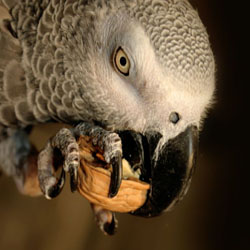 Training with treats can be a quick and effective method of
Training with treats can be a quick and effective method of 